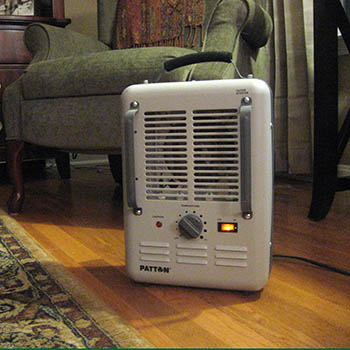
Many electric space heaters advertise they can slash your electric bill. What they don’t advertise is that they can also cause that bill to increase significantly.
Whether it’s a standard electric space heater you can buy at a store or a “ruby quartz” or “infrared” souped-up model advertised in a newspaper or on a billboard, the thing you need to be concerned about is simply how much power the unit consumes. This is most commonly given in watts. Check the box or the unit itself for this information.
Many electric space heaters are rated at 1,500 watts. This rating is how much power the heater uses. You are billed for each kilowatt-hour of electricity you consume. A thousand watts is equal to one kilowatt, so 1,500 watts is equal to 1.5 kilowatts. This means for each hour the space heater is running it consumes 1.5 kilowatt-hours of electricity, which costs about 16 cents.
Doesn’t sound like much does it? But running that heater nonstop is a surefire way to increase your bill. If you ran one 1,500-watt space heater for 18 hours a day for a single month it would cost about $86. That’s on top of your normal bill.
So where are the savings that are often touted on such items? An electric space heater can save you money, but only if you reduce the running time of your electric furnace or other primary heating system.
A space heater could reduce your electric bill, for instance, if you lowered the thermostat on your electric furnace from 72 F to 66 F and used the space heater to heat a single occupied room up to a comfortable temperature. If, however, you’re using the space heater to heat an area of your home normally not heated, like an enclosed porch, then the space heater is simply an additional cost to your electric bill.
Also, keep in mind that if you’re using an electric space heater to supplement a propane furnace, then you may see a drop in the amount of propane you use, but your electric bill will still increase because of the addition of the heater.
Electric space heaters can provide an effective and simple means of heating that cold, unconditioned tool shed, bedroom or other relatively small space, but you should always follow safety precautions to prevent injuries and fires.



